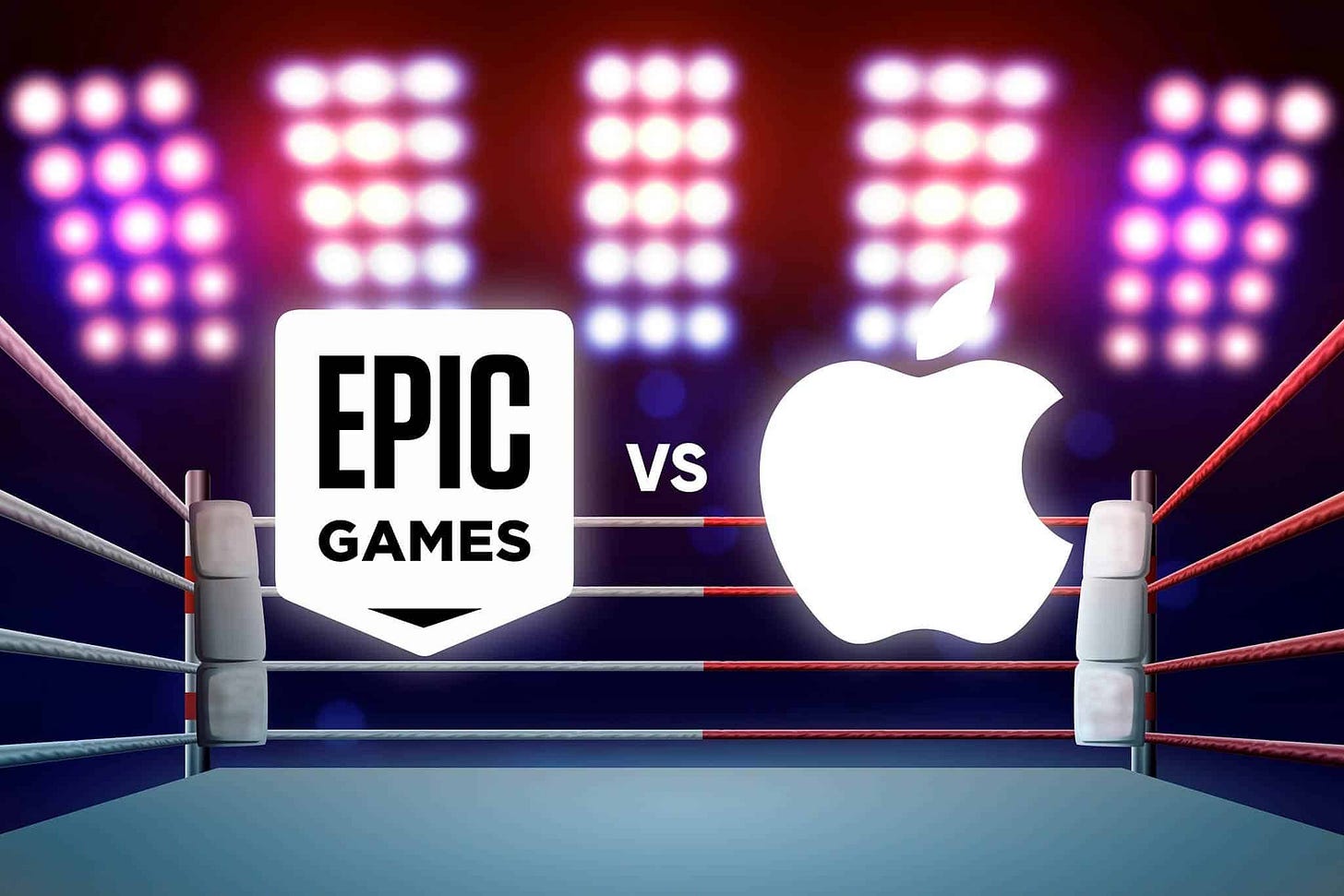epic vs apple explained 😠 - part 1
The lawsuit is getting spicy.
Who wins: a literal enterprise-sized game studio making billions of revenue per year from various verticals, or some fruit boi with a few app store powers?
Background
Apple has this interesting guideline for the revenue of 3rd party apps in its iOS App Store: a 30% slash on IAPs (In-app purchases). Simply put, outside developers can’t be running away with all the cash they earn, even if it’s not that much to begin with.
As of the beginning of last year, Apple hit 1.5 billion active users amongst all its consumer devices1. Serving this pool is an army of 3rd party iOS developers earning $200 billion USD for the year of 2020, with a 29% YoY from 20192.
But let’s not try to emphasize too much on centipedes vs caterpillars - Epic Games is a large and prestigious game studio in its own right. Deservingly famous for so many games over the decades, the company finally gained the spotlight with its cross-platform title, Fortnite. While Fortnite’s iOS version never topped its Playstation version in usage, it nevertheless opened the door to millions of iPhone gamers.
This tweet by Matthew Ball illustrates the MAUs for Fortnite in an incredibly lucid format - and the importance of cross-platform utility for Epic is hugely visible.
The early tussle
So what gives?
Epic doesn’t like Apple’s 30% cut policy. In fact, they loathe it, as you can kinda tell.
I’d assume Epic probably isn’t the only customer vexed by this cut. Facebook has had its own issues with Apple’s policies - and somewhat of a proxy war has resulted since. For example, in the past, Apple has prevented Facebook from delivering an update to its users clarifying that in-app purchases incurred a 30% cut by the former3.
Epic and Apple, however, jumped straight into onslaught within a year. On August 13, 2020, Epic released an attentive new patch for its iOS Fortnite build. Customers could now make direct payments to Epic without needing to go through Apple or Google (Play Store) first - thus allowing them to bypass Apple’s 30% cut. Sneaky-sneaky, eh?
Apple, being reasonably adamant on its terms of service (ToS), retaliated immediately, straight up banning Fortnite from their store. The message was clear: pay us, or pay a lawyer. Google’s Play Store followed subsequently, as Epic’s new update affected their methods of collecting payment also.
In a moment’s time, Epic lost access to hundreds of millions of potential new users.
As you can tell, August 2020 was a downward spiral for the gaming studio. I’d imagine Tim Sweeney, Epic’s CEO, was probably livid - Apple and Google’s power to control their respective app stores was utilized within a blink of an eye. We witnessed a tech giant’s extent of dominating influence towards a certain market in full flesh. Such monopolistic issues surrounding tech giants can date all the way back to Microsoft’s “monopolization attempt” against competitors such as Netscape back in the ‘90s.
The next step was simple: Epic sued Apple for antitrust.
In more technical terms, they “filed a legal complaint for injunctive relief,” as per Gökhan Çakir on Dot Esports4. Apple didn’t even stop the fire there; they were ready to burn Epic to ashes and sweep them away like dust. 4 days after deleting Fortnite off its App Store, they declared a revoke of Epic’s iOS developer access. This meant that engineers from Epic could no longer build & test with Apple’s iOS tools, and thus all existing Apple Fortnite users who still had the app installed could no longer receive updates. The damage also extended to Unreal Engine, a popular game engine released and updated regularly by Epic, who used iOS developer tools to support its construction. This was detrimental to all games which ran on Unreal, since Epic no longer could support game developers who relied on Unreal to make their games. The entire game development ecosystem was harmed: an unsupported Unreal Engine meant all Mac and iOS games reliant on it were plainly screwed. Even Microsoft chimed in for Epic at this point, telling Apple they were hurting the entire community.
From Apple to Epic, the notion was clear as day: you guys are powerless without us.
So what did Epic do as a response? We’ll dive in next week to catch-up to the present, as the trial continues to unfold right now as we speak.
Turn that frying pan into a drying pan.
Kasey
Potuck, M. (2020, January 28). Apple hits 1.5 billion active devices with ~80% of recent iPhones and iPads running iOS 13. https://9to5mac.com/2020/01/28/apple-hits-1-5-billion-active-devices-with-80-of-recent-iphones-and-ipads-running-ios-13/.
Statista. (2021, February 4). Total Apple App Store developer earnings 2021. Statista. https://www.statista.com/statistics/235418/total-apple-app-store-ios-developer-payout/.
Warren, T. (2020, December 16). Facebook criticizes Apple's iOS privacy changes with full-page newspaper ads. The Verge. https://www.theverge.com/2020/12/16/22178068/facebook-apple-newspaper-ads-ios-privacy-changes.
Çakir, G. (2020, November 24). Apple vs. Epic Games Fortnite Lawsuit Timeline. Dot Esports. https://dotesports.com/fortnite/news/apple-vs-epic-games-fortnite-lawsuit-timeline.



